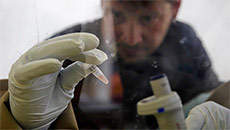Women who are shy and more sensitive to stress are more likely to develop Alzheimer's disease, found a research.
Women who worry, cope poorly with stress and experience mood swings in middle age run a higher risk of developing Alzheimer's disease later in life, it showed.
"Some studies have shown that long periods of stress can increase the risk of Alzheimer's disease and our main hypothesis is that it is the stress itself that is harmful," said Lena Johansson, scientist at the University of Gothenburg' Sahlgrenska Academy in Sweden.
Shy women who, at the same time became easily worried, turned out to have the highest risk in the study.
People who have neuroticism are more readily worried, distressed and experience mood swings. They often have difficulty in managing stress.
"A person with neurotic tendencies is more sensitive to stress than other people," Johansson added.
The study carried out at the Sahlgrenska Academy followed 800 women for nearly 40 years.
The women stated whether they had experienced long periods of high stress and underwent memory tests.
At the follow-up in 2006, nearly 40 years later, around one fifth of these women had developed conditions associated with dementia.
"We could see that the women who developed Alzheimer's disease had been identified in the personality test 40 years earlier as having neurotic tendencies," Johansson pointed out.
The study is forthcoming in the journal Neurology.





